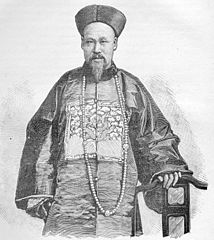Zeng Jize
Zeng Jize was a prominent Qing Dynasty diplomat, and son of the celebrated general Zeng Guofan.
In addition to his classical Confucian education, Zeng studied a number of foreign languages, became fluent in English, and made efforts to keep informed as to events in Europe. He served as one of China's first envoys to London, Paris, and St. Petersburg, living in Europe from 1879-1885, and played a key role in several significant events of the time, including negotiations related to the 1884 Sino-French War over control of Vietnam, and the 1881 Treaty of St. Petersburg, which settled territorial disputes in Xinjiang between China and Russia.[1]
References
- Gallery labels, "The Reformer’s Brush: Modernity and Traditional Media in China," University of Hawaii Art Gallery, March 2011.
- ↑ "Ili crisis (Chinese history)," Encyclopedia Britannica, accessed 25 Dec 2013.
